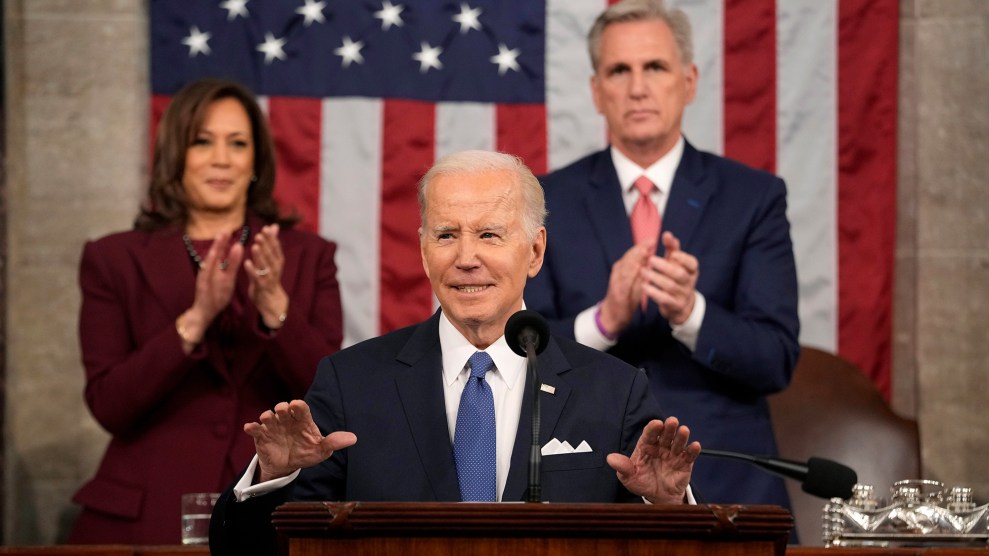
During his State of the Union address, Biden teased Republicans who opposed the Inflation Reduction Act but were happy to take credit for the projects it funded.Jacquelyn Martin/AP
This story was originally published by the Guardian and is reproduced here as part of the Climate Desk collaboration.
Georgia, a state once known for its peaches and peanuts, is rapidly becoming a crucible of US clean energy technology, leading a pack of Republican-led states enjoying a boom in renewables investment that has been accelerated by Joe Biden’s climate agenda.
Since the passage of the Inflation Reduction Act (IRA) in August, billions of dollars of new clean energy investment has been announced for solar, electric vehicle, and battery manufacturing in Georgia, pushing it to the forefront of a swathe of southern states that are becoming a so-called “battery belt” in the economic transition away from fossil fuels.
“It seems like all roads are currently leading to Georgia, it’s really benefiting disproportionately from the Inflation Reduction Act right now,” said Aaron Brickman, senior principal at energy research nonprofit RMI. Brickman said the $370 billion in clean energy incentives and tax credits in the bill are a “complete game changer. We’ve just frankly never had that before in this country. The IRA has transformed the landscape in a staggering way.”
Georgia is part of a pattern where Republican-headed states have claimed the lion’s share of new renewable energy and electric vehicle activity since the legislation, with Republican-held congressional districts hosting more than 80 percent of all utility-scale wind or solar farms and battery projects currently in advanced development, according to an analysis by American Clean Power.
States blessed with plentiful wind and sunshine, along with significant rural and industrial communities, such as those across the Great Plains and the south, appear best positioned to capitalize on the climate bill. Texas, already a bastion of wind power, could see $131 billion in IRA-linked investment this decade, Florida may see $62 billion and Georgia $16 billion, according to an RMI analysis.
The irony of this bonanza, which is coming despite no Republican voting for the climate spending, was alluded to by Biden in his recent state of the union address. “My Republican friends who voted against it—I still get asked to fund the projects in those districts as well,” the president said, to jeers from some members of Congress. “But don’t worry, I promised I’d be a president for all Americans. We’ll fund these projects and I’ll see you at the groundbreaking.”
A mixed political groundbreaking did take place in Georgia in October, when Brian Kemp, the Republican governor, was served champagne by a robotic dog before ceremonially shoveling dirt alongside Democratic senators Raphael Warnock and Jon Ossoff to kick off Hyundai’s first dedicated electric vehicle plant in the US.
The $5.5 billion facility in Bryan county, which will create around 8,000 jobs when it opens in 2025, came about because “we heard the clarion call of this administration to hasten the adoption of new electric vehicles and reduce carbon emissions,” according to José Muñoz, Hyundai’s global president.
Ossoff told the Guardian he has long held a vision that Georgia “should be the advanced energy innovation and manufacturing hub for the US” and credits a bill he wrote, the Solar Energy Manufacturing for America Act, which was then folded into the IRA, for helping convince Hanwha Qcells, another South Korean-owned company, to commit $2.5 billion for two new solar panel factories in the state in January.
“This targeted legislation was by no means a foregone conclusion but passing it has opened the floodgates in Georgia,” Ossoff said. Democrats have touted the bill for not only helping tackle the climate crisis but also as a way to wrest the initiative from China, which has dominated the manufacturing of parts for clean energy systems and electric cars until now.
Georgia’s embrace of clean energy technology was under way before the IRA, with Atlanta, bolstered by leading renewables research at Georgia Tech, increasingly viewed as an innovative fulcrum. In 2022, Freyr, a Norwegian company, announced a $1.7 billion battery plant for Coweta county, south of Atlanta, while SK Battery, yet another South Korean-owned firm, said last spring it will hire another 3,000 workers at its battery factory in Commerce, north-east of Georgia’s capital.
Rivian, the electric car company, meanwhile is keen to build a sprawling $5 billion facility east of Atlanta although it has faced opposition from some residents in the small town of Rutledge, who have sued to stop the development.
But last year’s IRA, with its sweeping tax incentives for emissions-reducing technologies, has made the environment even more enticing. Scott Moskowitz, head of market strategy for Qcells said that Georgia has been a “great home” since 2019 but that the IRA is “some of the most ambitious clean energy policy passed anywhere in the world” and gave the Hanwha-owned company certainty to triple capacity at its site in Dalton, which already cranks out around 12,000 solar panels a day, as well as create a new complex in Cartersville that will manufacture ingots and wafers, the basic building blocks of solar panel components, made from polysilicon.
“There’s a ton of opportunity and excitement in [the] clean energy sector right now,” Moskowitz said. “We’ve always had strong support from both sides of the aisle, even if there hasn’t always been agreement.”
Barry Loudermilk, a Republican congressman whose House of Representatives district includes Cartersville, denied that the rush of investment is politically awkward for the GOP, accusing Biden of an “elementary school-level response” to the issue in his state of the union speech.
“I’m not against this industry and I’m all about bringing in new technology, but it has to be market-driven,” Loudermilk told the Guardian. “When the government heavily subsidizes something it will crest and then fall down because the market hasn’t matured.
“We aren’t ready for this (full EV and clean energy adoption). This is just subsidizing one industry over another and just throwing taxpayer dollars at something usually just leads to failure, and sets you back a decade.”
Georgia is a draw for businesses due to its relatively low tax rate, transport links—including Atlanta’s busy airport and Savannah’s deep port—and a diverse and adept pool of workers, according to Loudermilk. “The days of the backwoods country bumpkin are in the past, we have educated, skilled workforce,” he said.
It’s uncertain whether Loudermilk will be at the Cartersville groundbreaking, nor Marjorie Taylor Greene, the far-right extremist who represents the neighboring congressional district that includes Dalton. Greene has previously said the IRA is an “energy disaster” and erroneously said that global heating is “actually healthy for us,” although she has said she welcomes any new jobs to Georgia.
Kemp, meanwhile, has offered state-level incentives for firms to set up in Georgia, while denouncing Democrats for “picking winners and losers” with the national climate bill. The governor recently pitched his state as a destination for clean tech investment at Davos and has denied any hypocrisy in his stance.
“Georgia is a destination state for all manner of new jobs and opportunity despite the bad policies coming out of DC—not because of them,” said a spokesman for Kemp. “Companies are choosing Georgia over places like New York and California because they know they’ll find success here, not because of the IRA.”
Even if the causes for the renewables investment are in dispute, the trajectory of the transition is becoming more undeniable. As the cost of renewables continues to plummet and more Americans turn to electric cars, thanks in part to the “unprecedented scale” of the IRA, partisan divides on the issue may soften, according to Ashna Aggarwal, an associate at RMI, the energy research nonprofit.
“This is a bill that benefits everyone and it actually benefits the people who weren’t necessarily in favor of the bill the most,” Aggarwal said. “I think what’s really exciting about the clean energy economy is that party lines don’t really matter here. There’s more opportunity for Republican states and I hope that Republican policymakers see that and really think this is good for the people who are living in our states.”















